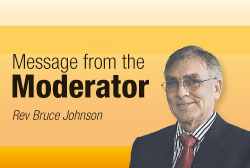
ONE OF the most common questions I’ve been asked in the past few weeks is, “What do you think about a PM who does not believe in God?”
This causes us to think about how Christians engage in the political arena in a pluralist society.
Julia Gillard is not the first Australian Prime Minister who has not claimed to hold the Christian faith.
Gough Whitlam used to describe himself as a “fellow traveller” with Christians.
Bob Hawke described himself as an agnostic.
However I don’t remember any previous leader being asked point blank, “Do you believe in God?”
I was rather impressed that Ms Gillard responded honestly with, “No, I don’t believe in God”. She went on to say, “For people of faith, I think the greatest compliment I could pay to them is to respect their genuinely held beliefs and not to engage in some pretence about mine.”
Tony Abbot and Kevin Rudd both declared openly that they were Christian, however each held different opinions about how their personal faith shaped the leadership of their parties.
Each of these men also had to recognise that, since not all Australians shared their faith, they could not use their power in government to impose their values upon the nation.
This same difficulty faces every person of faith when they enter the political arena.
In a pluralist multi-cultural society can we expect our governments to legislate according to the beliefs and values of Christians?
Should the beliefs of the leader of the government shape the way they legislate?
The same challenge also faces those who hold no faith.
If a Christian or Muslim politician must be careful not to discriminate against others of different beliefs and values, so a person who holds no religious beliefs must be careful not to discriminate against those who do.
This creates a dilemma.
Do Christians band together and try to dominate the political debate and have our opinions shape all legislation or do we work with people of other beliefs and values to develop a common consensus that will build a better nation for all?
While we remember that the arrival of the first boat people in 1788 and subsequent immigra-tion had a devastating impact upon the Indigenous people of this country, we have gradually built a relatively unified and harmonious nation.
We have been able to accommodate the most diverse range of cultures and religions without resorting to civil war.
We have learned to tolerate, even respect each other, and sometimes even celebrate our diversity. Often this has been achieved by quietly agreeing not to discuss contentious issues.
We have begun to openly discuss our differences and even apologise to one another for past hurts and failures of love. It is this respect, understanding and maturity that I would like to see grow from the conversation about our political leaders’ revelations about faith and belief.
The current Roman Catholic – Uniting Church dialogue has begun to tackle the challenge to build a common understanding about “Theology in the Public Space”.
We are trying to find common ground that will allow us to engage in public theological conversations without falling into the old sectarian divisions of our past.
We are convinced that it is important that the insights of the Christian Church be heard not out of a desire to dominate, but with a desire to serve the well-being of all in our nation.
We need to find a way of helping to develop a unifying vision for our nation that embraces all its citizens.
Election campaign battles hold up a mirror to our society.
The issues that are at the forefront of campaigns point to our shared fears and greed. Political candidates are keen to tell us how they can protect us from our fears and meet our wants. These conversations rarely help us find a noble vision for our country but simply promise to satisfy individual voters.
I don’t believe that the national debate should surround the particular religious beliefs of any political candidates, but rather we need a conversation about what sort of nation we want to build.
Jesus said he came to proclaim the reign of God and his actions and teaching showed us that this reign was a compassionate, inclusive vision that offered abundant life for all.
If we could help our nation catch this vision, we might also find that more people might begin to see how faith in Jesus Christ can transform and renew individuals and communities and want to join us in the mission of God.
The Assembly’s 2010 election resource Building an Economy for Life is a useful tool for those wanting to grapple with some of the issues facing Australia and the Church’s response to them.
Visit www.assembly.uca.org.au/election2010 for more information
 JourneyOnline
JourneyOnline






